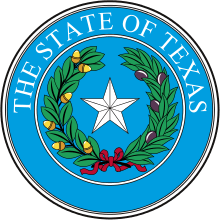United States presidential election in Texas, 1972
The 1972 United States presidential election in Texas was held on November 7, 1972. Incumbent Republican President Richard Nixon overwhelmingly won the state of Texas with 66.20% of the vote,[1] to the Democratic Party candidate George McGovern's 33.24%, thus giving him the state's 26 electoral votes. This was the first time a Republican won the state of Texas since 1956.
Nixon's win in Texas made him the first ever Republican presidential candidate to break 60% of the popular vote in a presidential election, surpassing former President Dwight D. Eisenhower's performance of 55.26% in 1956, and even native son Lyndon B. Johnson's 63.32% in the 1964 election. Nixon is so far the only Republican candidate to also break 65% in the state. At the county level, 246 of Texas's 254 counties voted for Nixon, all by wide margins. McGovern's only county wins came from the south Texas region along the U.S.-Mexico border and Cottle County in the northern part of the state, though even his performances here were underwhelming. Duval County, however, gave McGovern over 85% of the vote, which was the highest percentage of votes he received in any county nationally.
As with the rest of the country that year, with the exception of Massachusetts and Washington, D.C., Texas voted for the Republican candidate as Nixon emphasized on a good economy and his successes in foreign affairs, such as coming near to ending American involvement in the Vietnam War and establishing relations with China. McGovern was constantly portrayed throughout the campaign as being a left-wing extremist, and inconsistent following the replacement of his first running mate, Thomas Eagleton.
References
|
|---|
|
| Candidates | | |
|---|
|
General
articles | |
|---|
|
Local
results | |
|---|
|
Other 1972
elections | |
|---|



